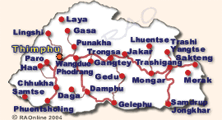YANA Travel
Photo
Gallery
Places
of Interest
|
 |
 |
| Spotting
the rare black necked crashes in the meadows next to Gangtey Gompa is an
ornithologist delight. The cranes migrate from the high plains of the Tibetan
plateau in winter to the milder climate of Phobjikha.
Gangtey
is an old monastery, inhabited only in summer, a few hours drive from Wangdiphrodrang. |
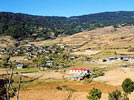 |
The
last valley in central Bhutan, Ura Valley,
is also the highest in Bumthang.
Ura
village and its new monastery are a charming stop before the climb to the
east. |
|
 |
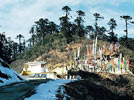 |
The
difference between East and West Bhutan are as far greater than the high
pass that separates them. |
Perhaps
like the Scots and the English, there are subtle but marked differences.
The journey from Bumthang to Mongar is one the most beautiful in the Himalayas
crossing 3800m high Thrumshing La pass.
The descend from Thrumsing La to Limithang is astonishing for several reasons.
The road drops from 3800m to 650m in only a few hours passing from pine
forest through semi-tropical forest to orange groves. |
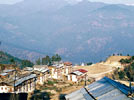 |
Arriving
at MONGAR marks
the beginning of your Eastern Bhutan experience. The towns in Eastern Bhutan
are built on the sides of the hills, which contrast, to the West where
they are concentrated mainly in valleys. |
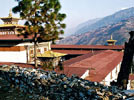 |
MONGAR
DZONG was built in 1953 on the orders of the Third King, Jigme
Dorji Wangchuk. It is one of the newest Dzongs and yet it is
built in the same method and ... |
traditions
of all the other Dzongs, no drawing and nails have been used.
|
 |
|
In
the far east of Bhutan, lies Tashigang at an elevation of about 3200m.
It is the country's largest district. Tashigang is also a melting pot of
hill tribe people who come into the town to trade. In particular, the unusual Merak
and Sakteng people come to Tashigang to trade yak's milk products
for provisions that they need in the mountains. Merak and Sakteng are located
about 80km East of Tashigang close to the border with the India's Arunachal
Pradesh. |
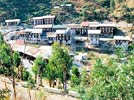 |
TASHIGANG
DZONG sits on a jagged piece of land jutting out from the town
and it the first landmark that can be seen from the road winding up to
Tashigang. |
The
Dzong was built in 1659 and it commands a spectacular view over the valley.
It also houses the office of the Dzongda (District Commissioner) and home of the monk body. Unlike the other dzongs,
it has only on courtyard.
|
 |
|
The
village of Doksum is a few kilometres
east of Gom Kora, a small temple on
the side of the road. A large boulder sits in the garden of Kom Gora and
it is said that if anyone can climb below the rock and emerge from its
summit, he will be forgiven of his sins.
TASHYANGTSE
DZONG lies at an elevation of about 1800m and was built in 1656
and it was completely renovated in 1976. Like other Dzongs, it is the administrative
centre. |
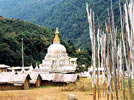 |
Please click on the image
Chorten
Kora is one of the only two such stupas in Bhutan with styles
similar to those found in Nepal and it host to a great
festivalevery March which attracts
all of East Bhutan's residents. |
The
Chorten is entirely whitewashed and ideally situated next to a running
brook. |
|






